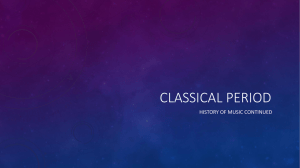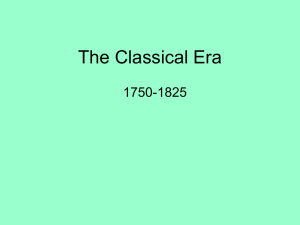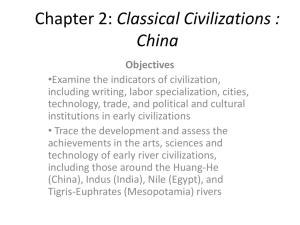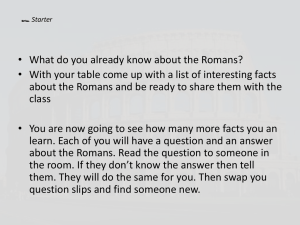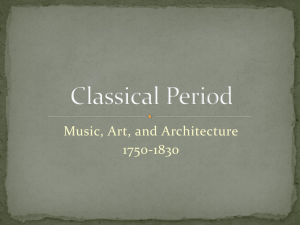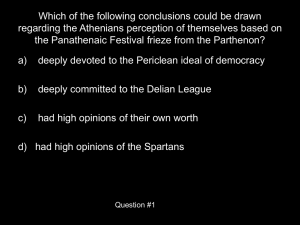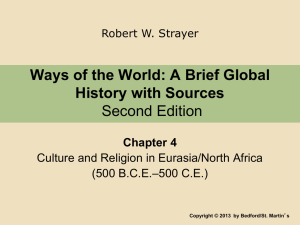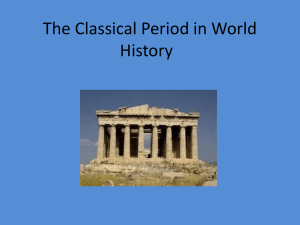CLS workshop - SecondarySocialScience
advertisement
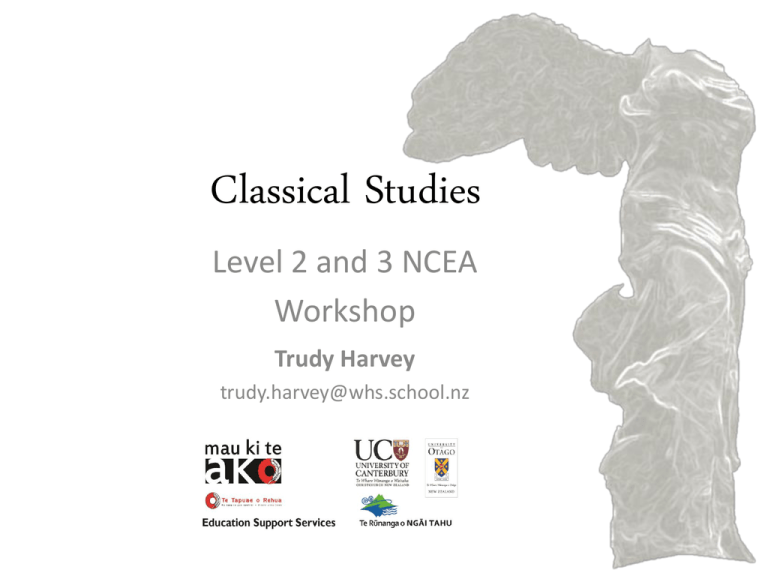
Classical Studies Level 2 and 3 NCEA Workshop Trudy Harvey trudy.harvey@whs.school.nz Purpose and intentions A Explore and develop useful literacy practices to meet the needs of all students A Reflect on L2 Classical Studies so far A Understand what is expected in the new L3 and Scholarship Classical Studies A Design an effective L3 Classical Studies programme catering for your student needs “Let each man exercise the art he knows.” Aristophanes Getting to know our Classics learners NZC places the learner at the centre of teaching and learning and teachers need to “attend to the cultural and linguistic diversity of all students” (p34) So, in order to create an effective, inclusive and dynamic learning environment for our students: A What do we need to know about our students before we start teaching them? A Why should we find out about these specifics? http://www.ascd.org/publications/books/111011/chapters/Knowing-Our-Students-as-Learners.aspx KNOW YOUR LEARNER LIKES (‘stuff’ student enjoys) CULTURAL AND SOCIETAL FACTORS DISLIKES (‘stuff’ student doesn’t enjoy) (ethnic & racial background, cultural identity, economic status, languages) BACKGROUND – SUCCESSES (medical conditions/learning &/or physical disabilities) STUDENT: ACADEMIC (reading skills, focus, past success, written language, interpretation EMOTIONAL/SOCIAL INFLUENCES STRENGTHS CHALLENGES Adapted from Making Links for Learning Siliva Gaugatao, Team Solutions (AKL) (family structure and history, peer status, selfesteem, attitude) Get to know your learner in context Citizenship and Society Heritage Culture and Identity Art and Aesthetics Empire and Power Conflict Responding to the Data A A A A Relationships with students Programme design Approaches to teaching and learning Raising engagement and achievement Example from WHS… Level 1: Heroes and Villains AS91021 Homer’s Heroes: The Odyssey Demonstrate understanding of ideas and values of the classical world. 4 credits Level 2: Drama Drama Level 3: Death Perception 1.1 AS91200 2.1 Aristophanic Comedy – Frogs and Clouds Virgil’s Aeneid Examine ideas and values of the classical Analyse ideas and values of the classical world. world. External 4 credits AS91022 1.2 Images of Heroes in Greek Vase Painting Demonstrate understanding of the significance of features of work(s) of art in the classical world. 4 credits External 4 credits External AS91201 2.2 3.2 Pompeii Domestic Art and Architecture Images of Death and the Afterlife in Greek Examine the significance of features of work(s) Vase Painting of art in the classical world. Analyse the significance of a work(s) of art in 4 credits External the classical world. External AS91023 1.3 Julius Caesar Demonstrate understanding of an important historical figure in the classical world. 3.1 4 credits External AS91202 2.3 3.3 Eruption of Vesuvius Socrates Demonstrate understanding of a significant Analyse the impact of a significant historical event in the classical world. figure on the classical world. 4 credits External 4 credits AS91024 Relating to Caesar - Roman Social Relationships Demonstrate understanding of social relationships in the classical world. 1.4 AS91203 2.4 3.4 Athenian Democracy and Social Life Religious and Philosophical beliefs about Examine socio-political life in the classical Death and the Afterlife in Athens and/or world. Rome 6 credits External Demonstrate understanding of significant Internal ideology(ies) in the classical world. 6 credits Internal 6 credits 6 credits Will also be offered in Y10 CLS in 2013 AS91025 1.5 Extraordinary Heroes: Modern Mythological Film Representations Demonstrate understanding of links between aspects of the classical world and another culture. AS91204 2.5 Athenian Comedy and Modern Political Satire Demonstrate understanding of the relationship between aspects of the classical world and aspects of other cultures. 6 credits 6 credits Internal Internal External Internal 3.5 Representations of Death and the Afterlife in Greek Vase Painting, Renaissance Art and Literature, and modern media Demonstrate understanding of the lasting influences of the classical world on other cultures across time. 6 credits Internal 2012 -2013 Level 2 A What worked well? Not so well? A New ideas/topics/teaching/learning Level 3 A Excited about? A Concerned about? General queries?? Developing capability How do we go about building our students reading and writing capabilities to address the requirements of the external Classical Studies standards? Are these skills the same or different for internals? Level 3 A Learning Objectives A Indicators A Concepts A Achievement Standards Learning objective 8-1 Students will gain knowledge, skills, and experience to: understand the complexity and diversity of social, political, artistic, and ideological aspects of the classical world and how these aspects influenced the lives of Greeks and Romans living in those times. Indicators Selects relevant evidence and uses it to analyse the complexity and diversity of social, political, artistic, and/or technological aspects of the classical world. Thinks critically about primary and secondary sources about social, political, artistic, and/or technological aspects of the classical world. Analyses different perspectives on the connections between social, political, artistic, and/or technological aspects of the lives of the ancient Greeks and Romans. Concepts addressed in this learning objective Citizenship and society Culture and identity Empire and power Conflict Art and aesthetics Key concepts in classical studies Possible context elaborations Power and freedom, as conveyed through literary texts such as Philocleon in Aristophanes’ Wasps, the role of destiny in Virgil’s Aeneid, Trimalchio’s banquet in Petronius’s Satyricon, the patron-client relationship in Juvenal’s Satires, Augustus’ constitutional reform in Suetonius’s The Twelve Caesars: who holds real power? Literary conventions, such as the use of language and imagery, for example, Aristophanic humour, Virgilian symbolism: to what extent do literary conventions carry a message? Art and architecture: the significance of features of work/s of art in their artistic/historical context, for example, Euphronios’s vases as illustrations of the development of Red Figure techniques: what makes a work of art realistic? OR the Arch of Titus illustrating imperial propaganda in the time of the Flavians: what is the connection between art and politics? Exercise of individual power (historical and literary), for example, Virgil’s Aeneas, Philip of Macedon, Alexander the Great, Cicero, and Augustus: to what extent were these models of leadership successful? Political alliances, such as the relationship between Alexander the Great and Parmenio or Augustus and Agrippa: how do you choose and use your friends? Competing ideologies – religious, philosophical, political belief systems, for example, Mystery religions, Christianity and Roman state religion, Socrates and the Sophists, Stoicism and Epicureanism, Alexander’s Oriental Policy: whose ideas are most convincing? Propaganda as an instrument of the state, for example, Alexander’s ‘divine’ status, prophetic passages in Virgil’s Aeneid: who is playing the instrument and who is listening to the music? Level 3 draft standards http://ncea.tki.org.nz/Resources-for-aligned-standards/Socialsciences/Classical-studies/Level-3-Classical-studies One standard per group – an expert group What are the key changes, what needs to be considered, thoughts… Then… Join another group and share your findings Wish list If you could teach anything you wanted, what would you include? What would you throw out? What new ideas and contexts would you like the course to contain? What do your students enjoy? What do students want to learn and do in Classics? How can you develop a course that provides for learner choice as well as teacher choice? What are the literacy and language skills required in Classics? Scholarship In the first section candidates will be required to select two contexts from the list below: • • • • Alexander the Great Augustus Socrates Virgil’s Aeneid • Aristophanic comedy • Athenian Vase Painting • Roman Art and Architecture Within each context there will be two questions from which candidates will choose one. Candidate responses should be in the form of a written essay. In the second section candidates will be required to select one concept from the list below: • Culture and Identity, with specific focus on religion and ideology • Conflict, with specific focus on political and military conflict. Candidates will be required to answer one question from this section, with reference to either ancient Greece or ancient Rome. Candidates will be required to analyse and interpret unseen sources of evidence (extracts and images) in relation to their selected concept. Candidate response can be in the form of bullet points, diagrams, notes, extended paragraphs or an essay. Your Turn Using what you already know about your students, and what we’ve talked about and seen today… Design a L3 programme for your L3 class next year. Design a matrix for Classical Studies in your school Success? AExplore and develop useful literacy practices to meet the needs of all students AReflect on L2 Classical Studies so far AUnderstand what is expected in the new L3 and Scholarship Classical Studies ADesign an effective L3 Classical Studies programme catering for your student needs Where to from here?

